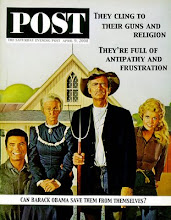It could be summed up by saying two out of five men mate indiscriminately like stud field mice.
I don't think I'm going to turn into Warren Steed Jeffs, imprisoned ex-ruler of a polygamist sect, soon. That's good. I couldn't stand being called prophet, seer, president of the
 priesthood, and revelator or find solace in observing two dozen child brides fight over who was going to wash my saintly garb. It sounds like a one-way ride to a bad prison shower scene, a mental breakdown or both instead of heaven.
priesthood, and revelator or find solace in observing two dozen child brides fight over who was going to wash my saintly garb. It sounds like a one-way ride to a bad prison shower scene, a mental breakdown or both instead of heaven.It took some Googling to get past routine "Of Mice or Men" takes by the mass media. There is a reason why journalists rank below used-car salesmen in opinion polls and readers seldom see a story about it. I found the original press release by the Karolinska Institute in Stockholm, Sweden. Scientists there expanded on earlier work where a specific gene variant, allele 334, was found in promiscuous male voles, also known as field mice in some redneck quarters and Norway. Allele 334 codes for a vasopressin receptor.
Vasopressin is a hormone found in most mammals. It is dumped from the pituitary gland into the blood stream where it plays a role in water retention and blood pressure regulation. Some of it is also released directly to the brain. Researchers believe it is linked to memory formation, agression, the aforesaid promiscuity, temperature regulation, social behavior, and several other neurological functions.
The consumption of alcohol is supposed to reduce vasopressin levels, which hasn't been proven by my in-depth research. When vasopressin levels increase, men exhibit agression toward other men particularly when women are around. This seemed odd considering the times I've had to work crime scenes in or outside bars. As far as social behavior goes, I'd rather rope enraged but sober range bulls than interview drunks at a crime scene.
Well, back to four-legged rodents. Researchers at Emory University in Atlanta observed the faithfulness of the male prairie vole and how they helped their mate raise the pups. Their black-sheep cousins, the meadow voles, play the field. However, scientists reformed some meadow voles by slipping a single gene into them via a virus. Their behavior was changed by the number of repetitions of a particular string of microsatellite, or junk, DNA, the same sequence found in humans. A male prairie vole has a longer DNA string than their meadow counterparts.
The Swedes have added to these vole-men comparisons:
"The incidence of allele 334 was statistically linked to how strong a bond a man felt he had with his partner. Men who had two copies of allele 334 were also twice as likely to have had a marital or relational crisis in the past year than those who lacked the gene variant. There was also a correlation between the men's gene variant and what their respective partners thought about their relationship. ... Women married to men who carry one or two copies of allele 334 were, on average, less satisfied with their relationship than women married to men who didn't carry this allele."
Maybe gene charts will replace star charts, palm reading, tarot cards, personality profiles, boxers vs. briefs, couple's retreats, short-term address sharing, relationship counseling, anger-management programs, and tasteful tribal tattoos and body piercing considerations. Examine the male's DNA string length instead. If rodents can be turned into strong father figures with a gene-virus cocktail, all sorts of social engineering feats are possible. It also opens up a new realm of legal, ethical and moral questions that dwarf those we deem hopelessly unanswerable now.

In the meantime, I think trial lawyers should latch onto this data. It could be the new Twinky defense. Bad genes excuse bad behavior.
Vasopressin receptors aside, men should remember the words of Rudyard Kipling, "The female of the species must be deadlier than the male."

No comments:
Post a Comment